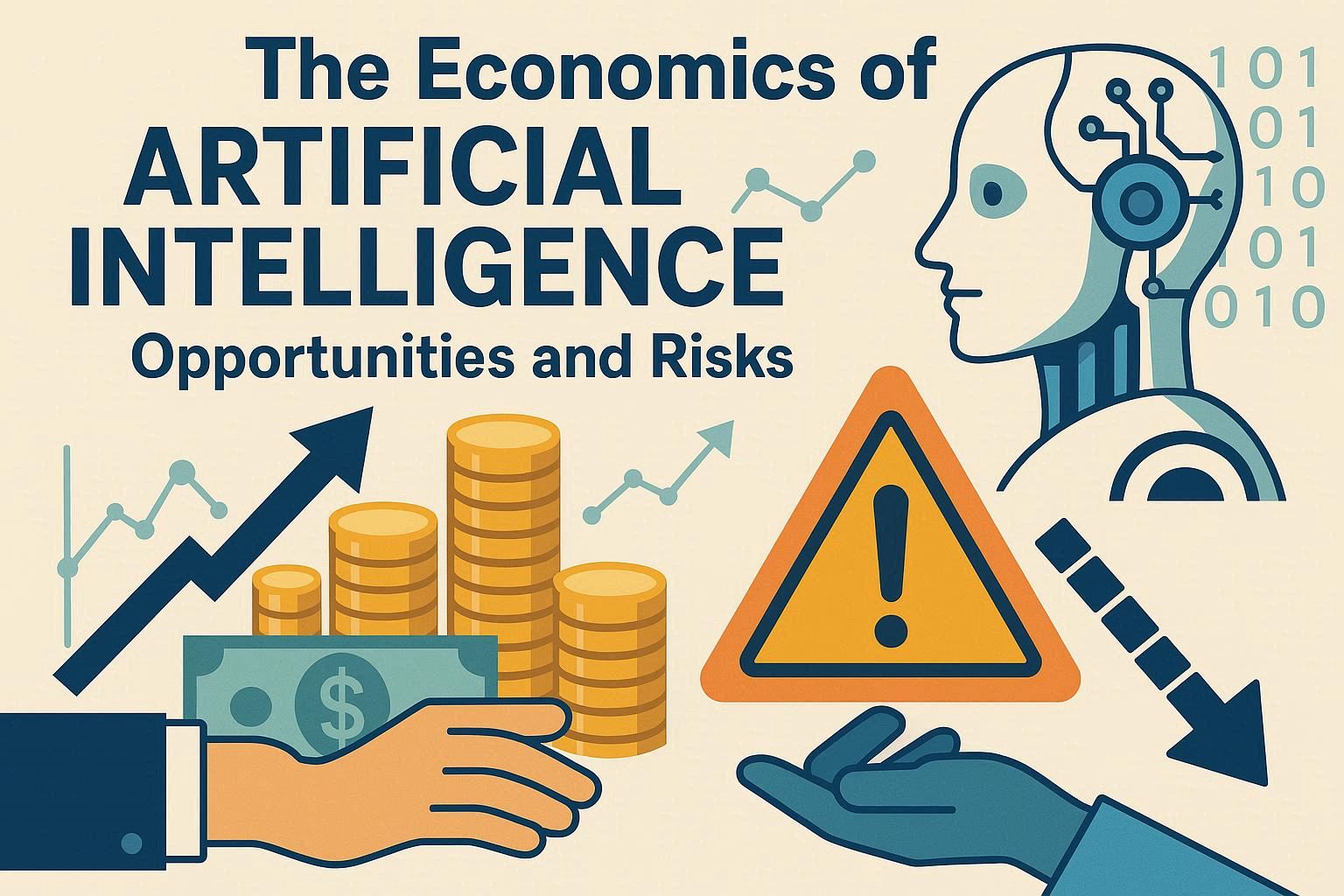Artificial Intelligence (AI) is no longer just a futuristic concept—it has become one of the most powerful drivers of economic change in the 21st century. From automating everyday tasks to reshaping entire industries, AI is creating both opportunities and risks for global markets. In 2025, the economic impact of AI is more visible than ever, influencing productivity, employment, trade, and innovation on a global scale.
This article explores the economic opportunities created by AI, the potential risks it introduces, its influence on industries and jobs, and how governments, businesses, and individuals can adapt to the AI-driven economy.
1. What Is Artificial Intelligence in Economics?
Artificial Intelligence refers to computer systems capable of performing tasks that typically require human intelligence—such as decision-making, pattern recognition, and problem-solving. In economics, AI is used to improve efficiency, reduce costs, and generate new sources of growth. Examples include AI-powered chatbots in customer service, predictive algorithms in financial markets, and autonomous robots in manufacturing.
By integrating AI into production, logistics, and services, businesses gain faster insights, reduce errors, and achieve levels of efficiency previously unattainable.
2. Economic Opportunities of AI
AI offers enormous economic benefits for businesses, workers, and governments. Key opportunities include:
- Increased Productivity – AI automates repetitive tasks, allowing humans to focus on creative and strategic work.
- Cost Reduction – Businesses save money by replacing labor-intensive processes with automated systems.
- New Industries – Entirely new sectors, such as autonomous vehicles, smart healthcare, and AI-driven finance, are emerging.
- Better Decision-Making – AI analyzes vast datasets in seconds, helping businesses and governments make smarter choices.
- Global Trade Efficiency – AI improves supply chain management, making international trade faster and less expensive.
3. AI’s Impact on Jobs and Employment
One of the biggest debates about AI is its effect on employment. While AI eliminates certain jobs, it also creates new ones. For example:
- Jobs at Risk – Repetitive tasks such as data entry, customer service, and routine manufacturing are being automated.
- Jobs Created – AI generates demand for data scientists, machine learning engineers, AI ethicists, and cybersecurity specialists.
- Changing Skill Requirements – Workers will need to adapt by learning digital and analytical skills, as well as creativity and problem-solving.
The future of work will depend on how well societies prepare for this shift. Reskilling programs and education reform will be essential to minimize job displacement.
4. AI in Key Industries
AI is not limited to one sector—it is transforming almost every major industry:
- Healthcare – AI assists doctors with diagnostics, drug discovery, and patient monitoring, reducing costs and improving outcomes.
- Finance – Banks and investment firms use AI for fraud detection, algorithmic trading, and personalized customer services.
- Retail – Recommendation engines and inventory management systems increase sales and reduce waste.
- Transportation – Self-driving cars, AI-powered logistics, and smart traffic systems are revolutionizing mobility.
- Education – Personalized learning platforms adapt to individual student needs, improving efficiency in education systems.
5. Risks and Challenges of AI in Economics
While AI creates opportunities, it also brings significant risks:
- Job Displacement – Millions of workers may lose jobs if reskilling is not prioritized.
- Economic Inequality – Wealth may concentrate in countries and companies that dominate AI technology.
- Bias and Fairness – AI systems can inherit human biases, leading to unfair treatment in hiring, lending, or law enforcement.
- Cybersecurity Threats – AI can be used for hacking, misinformation, and financial fraud.
- High Costs – Small businesses and developing nations may struggle to adopt AI due to high investment requirements.
6. Government and Policy Response
Governments worldwide are working to balance innovation with regulation. Policies must address:
- Worker Transition – Training programs to help workers shift into new roles.
- Ethical Standards – Guidelines for fairness, accountability, and transparency in AI systems.
- Data Protection – Strong cybersecurity and privacy laws to safeguard citizens.
- Global Cooperation – Collaboration across countries to prevent misuse of AI and to ensure shared benefits.
Effective policies can ensure that AI enhances economic growth without deepening inequality or creating instability.
7. The Global Economic Impact
AI is projected to add trillions of dollars to the global economy over the next decade. McKinsey estimates that AI could contribute up to 16% to global GDP by 2030. The countries leading in AI adoption—such as the United States, China, and members of the European Union—will have significant advantages in innovation and competitiveness.
However, if developing nations fall behind, the digital divide may widen, creating new economic challenges on a global scale.
8. The Future of AI and Economics
The future of AI in economics will depend on how humanity manages its benefits and risks. Some trends to watch include:
- AI-Powered Governments – Governments may use AI for smarter tax collection, welfare distribution, and policy planning.
- Personalized Economies – Consumers may receive highly tailored financial services, shopping experiences, and healthcare solutions.
- Collaboration Between Humans and AI – Instead of replacing workers, AI will often work alongside humans to improve efficiency.
- Ethical AI – As awareness grows, companies will invest in fairness and accountability to build trust in AI systems.
Conclusion
Artificial Intelligence is reshaping the global economy in profound ways. It creates opportunities for growth, innovation, and efficiency, but it also presents risks that must be managed carefully. The balance between opportunity and risk will determine whether AI leads to a more prosperous and equitable world, or whether it deepens inequality and economic instability.
For businesses, embracing AI means staying competitive in a fast-changing market. For governments, it requires proactive policies to protect workers and ensure fairness. For individuals, it means continuous learning and adapting to new realities. In 2025 and beyond, AI will not just influence economics—it will define it.

